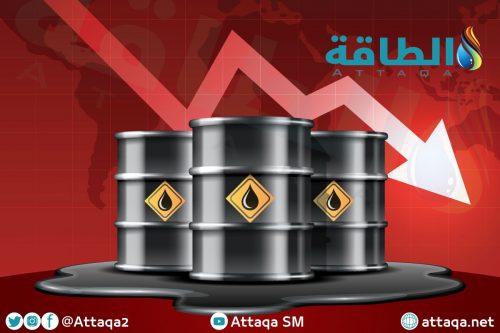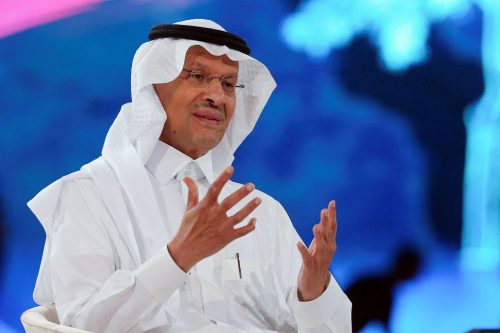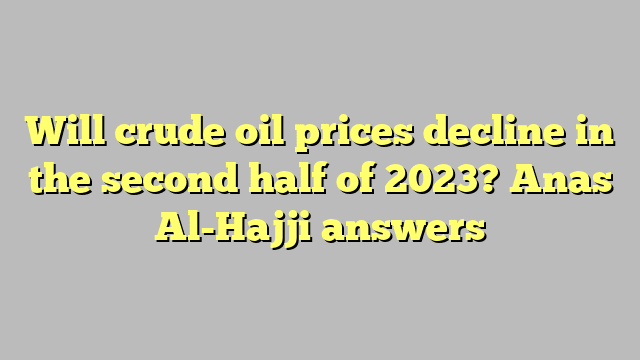Energy platform editorial advisor, energy economics expert Dr. Anas Al-Hajji, said that crude oil prices raise questions during the second half of this year (2023), with speculation about a further decline.
Al-Hajji added – during an episode of the program “Energy humanitiesHe presented it on Twitter with the headline “Energy Markets in the Second Half of 2023” – that Brent Crude Oil has fallen in recent weeks into the 70s, and is still in these limits until now.
And he continued: “When we talk about crude oil prices, we find that the price of Brent crude is around $75 per barrel, which is close to the price of Saudi Arabian Light Crude, which are good prices for the Gulf countries. If the price remains at $75 throughout the year, most of these countries will achieve surpluses.” in budgets.
He explained that the problem here lies in fluctuations in crude oil prices, not in the price of $75. The crisis appears when the price is $20 a barrel, then jumps to $120, so the stability of prices at their current level makes the situation of OPEC and the Gulf countries excellent.
Will crude oil prices drop?
Dr. Anas Al-Hajji, editorial advisor for the specialized energy platform, said that the oil market is currently witnessing a withdrawal by speculators, and therefore there is insufficient liquidity and trade has declined, which contributed to the drop in crude oil prices.
The problem now – according to al-Hajji – is that OPEC will meet on June 4, 2023, that is, several days from now, and no one knows what decisions it will take, but the crisis is that if you do not do anything to change the current situation, speculators will reduce prices. .
Dr. Anas Al-Hajji added: “Regardless of whether or not there is an economic recession, speculators will reduce prices if OPEC does not take any action, and then there will be suffering during the month of June as a result of that.”
Al-Hajji asked: Will there be any surprises during the OPEC meeting next June? Pointing to the statement of the Saudi Minister of Energy, Prince Abdulaziz bin Salman bin Abdulaziz, during his speech at the Qatar Economic Forum, during which he warned speculators against dealing in a way that lowers crude oil prices.
He continued, “The warning of the Saudi Energy Minister was interpreted by analysts, speculators, and oil traders in different ways. Some saw that the meeting would witness big surprises, and therefore the goal of Prince Abdulaziz bin Salman was to burn speculators who are trying to reduce prices.”
He explained that there are other opinions that the warning is directed at speculators who are trying to reduce crude oil prices from current levels, and then there will be no surprises during the next OPEC meeting in June, according to their interpretation.

Al-Hajji pointed out that the last opinion has more evidence, especially that OPEC and the Gulf states see and are convinced that there is no surplus in the market at present, that oil stocks are declining, and that the demand for oil will be greater than the supply, and therefore stocks will continue to decline, and prices will rise.
Therefore – according to Al-Hajji – OPEC believes that there is no need to do anything at all at the present time, while keeping things as they are, until the previously approved cuts, with the growth of oil demand, lead to a reduction in stocks.
Scenarios of changing the price curve
Energy economist Dr. Anas Al-Hajji said that OPEC does not see the need to take action, but there are several scenarios related to changing the curve of crude oil prices, explaining that if it wants to change the current price level, it can – for example – shift the voluntary cut applied starting from May. This May to a mandatory cut.
He pointed out that these measures may give greater signals in the oil market, but there are greater possibilities than that, including the possibility that the voluntary cut will turn into a mandatory official cut, after which Saudi Arabia and the Gulf states will announce another voluntary cut of one million barrels per day, for example, which sends a message to the market and raises Prices range between 3 and 7 dollars per barrel.
He added, “Crude oil prices will not fall below current levels unless OPEC does anything at all, which makes speculators take control of the market, then prices can drop by several dollars, but that will be for a short period.”
He continued: “However, prices will not decrease significantly from current levels except in the event of an economic recession, and there is no strong evidence now of the possibility of an economic recession, despite what many are deliberating about the possibility of its occurrence near the end of the current year 2023.”
He explained that in the event of this economic recession, oil prices will definitely fall, which will prompt OPEC to take decisions about what it will do, by reducing crude oil production or not.
related topics..
Also read..

Leave a Reply